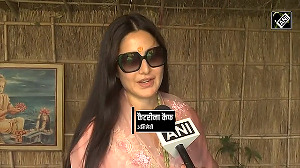Twelve people were detained in connection with the serial blasts that left two persons dead and over 24 injured in the Nepalese capital amid reports that two lesser-known ethnic groups have claimed responsibility for the attacks.
Police raided dozens of houses, lodges, hotels and other places after the near-simultaneous blasts rocked Kathmandu on Sunday.
A dozen people have been arrested and interrogated, police said. However, it is not clear whether they found anyone linked to the explosions that claimed the lives of a 12th standard girl student and a middle-aged woman.
"Some people have been detained and we are looking into their backgrounds and movements," Upendra Kanta Aryal, head of the Metropolitan Police Crime Investigation Department, said.
Though media reports in Kathmandu said two ethnic outfits from the restive Terai region -- Nepal People's Army and Terai Army -- claimed responsibility for the blasts, the officials have not yet confirmed whether these groups were actually behind the attacks.
Kathmandu is yet to recover from the shock of the blasts and very few vehicles have been plying on the otherwise busy city roads since the last couple of days.
Tyres were burnt and roads were blocked on Tuesday in parts of the city, including Balaju and Kalanki, by relatives and friends of the victims, demanding stern action against those responsible for the triple blasts.
Security has been put on high alert in the capital and other sensitive parts of the country, including the major highways connecting Kathmandu with other districts.
Uniformed and plainclothes policemen and other security personnel have been deployed to avert any untoward incident, a senior police officer said.
Time bombs were planted in all three bus stops situated on busy roads to cause the explosions, officials said. The Terai Army had earlier claimed to have carried out blasts that injured over a dozen people in Rautahat district in May.
The Terai region has been witnessing a violent agitation since early this year by Madhesis who are demanding a greater share in the politics and the economy of the country.
Nepal's government reached a peace agreement on Thursday with one of the major ethnic outfits, the Madhesi People's Rights Forum, but about half a dozen armed groups were still operating in the region.
The weekend attack was condemned by the United Nations and major political parties, including the Maoists who termed it as an attempt to disrupt the Constituent Assembly polls to be held in November and derail the peace process.





 © 2025
© 2025